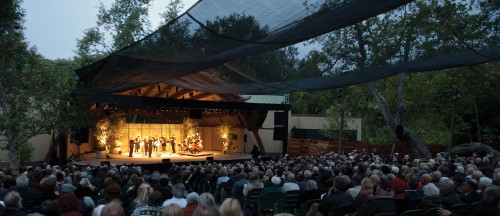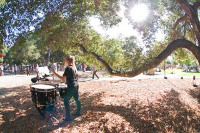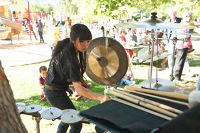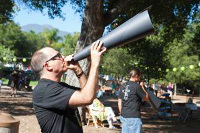
The rural town of Ojai is a little more than an hour and a little more than a lifetime outside of Los Angeles. In my mind’s eye Ojai is dreamlike and fantastical, like the Hundred-Acre Wood of Winnie the Pooh (in reality Ashdown Forest in East Sussex, a little more than an hour outside of London.) The Ojai Music Festival takes place in a rustic outdoor amphitheater, Libby Bowl, near the center of town. Recently, the band shell and seating have been updated into a superbly crafted and architected modern music venue, with the latest in sound and lighting technology. A vast wooded park with a scattered forest of sycamores and oaks, pocket meadows and paved pathways, tennis courts and a large playground surrounds the bowl.
 In its hallowed past, the festival hosted such legendary figures as Igor Stravinsky, Aaron Copeland and Pierre Boulez. The renowned Norwegian pianist Leif Ove Andses served as Music Director this year, as will the dancer and opera director Mark Morris next year. Artistic Director Thomas Morris, formerly of the Boston Symphony and Cleveland Orchestra, also oversees the Spring For Music Festival at Carnegie Hall. His signature approach to the music of our time, through its connection to the history of music, will distinctly guide the festival toward its 70th season in 2016. I plan on writing a more extensive portrait of Ojai later this year, and here offer only a glimpse of its magic.
In its hallowed past, the festival hosted such legendary figures as Igor Stravinsky, Aaron Copeland and Pierre Boulez. The renowned Norwegian pianist Leif Ove Andses served as Music Director this year, as will the dancer and opera director Mark Morris next year. Artistic Director Thomas Morris, formerly of the Boston Symphony and Cleveland Orchestra, also oversees the Spring For Music Festival at Carnegie Hall. His signature approach to the music of our time, through its connection to the history of music, will distinctly guide the festival toward its 70th season in 2016. I plan on writing a more extensive portrait of Ojai later this year, and here offer only a glimpse of its magic.
To open this year’s festival, Inuksuit, John Luth er Adam’s composition of percussive and musical sounds, took over all of Libby Park, and by extension all of Ojai and the entire universe. The experience was both ephemeral and eternal, almost a new art form, akin to the rambling stone installations of Andy Goldsworthy and the labyrinths of Jorge Luis Borges. A loose group of more than a dozen musicians and percussionists scattered themselves around the park, to make sounds that were initiated and ordered by the composer but seemingly orchestrated by nature itself.
er Adam’s composition of percussive and musical sounds, took over all of Libby Park, and by extension all of Ojai and the entire universe. The experience was both ephemeral and eternal, almost a new art form, akin to the rambling stone installations of Andy Goldsworthy and the labyrinths of Jorge Luis Borges. A loose group of more than a dozen musicians and percussionists scattered themselves around the park, to make sounds that were initiated and ordered by the composer but seemingly orchestrated by nature itself.
The entire space was open to the public, filled with spectators, wanderers, couples and small groups quietly chatting, listening and going about their lives. Children played on the jungle gym, my five-year old son Joseph among them. The renowned percussionist Steven Schick led the piece, eventually moving onto the jungle gym as well, performing from there. The music started softly, like a rockslide in slow motion or a quiet drawn out drum roll, and then grew into various crescendos moving around the park and among the audience, before coalescing and dying to a close more than an hour later.
 The Inuit word Inuksuit refers to the small towers of stones that the Inuit build as landmarks or guides in the vastness of the tundra, but it also means: “to act in the capacity of the human.” John Luther Adams wrote the piece as a wedding gift for his friend Steven Schick, who first performed it outside of Banff with 18 percussionists and three audience members. The sounds of the music are not quite natural, but perhaps supernatural, as if we look out on the world, listen to the world, and the world listens back. When we drove past the park the next day, with the windows open to the sun and breeze, my little boy Joey asked: “Daddy, where are the magicians?” He thought the musicians were there playing that music every day. Offering me window on his childlike, Borges-like, view of the universe, it seemed for a moment that the music simply extended out into the Milky Way, always resounding between the stars and the darkness.
The Inuit word Inuksuit refers to the small towers of stones that the Inuit build as landmarks or guides in the vastness of the tundra, but it also means: “to act in the capacity of the human.” John Luther Adams wrote the piece as a wedding gift for his friend Steven Schick, who first performed it outside of Banff with 18 percussionists and three audience members. The sounds of the music are not quite natural, but perhaps supernatural, as if we look out on the world, listen to the world, and the world listens back. When we drove past the park the next day, with the windows open to the sun and breeze, my little boy Joey asked: “Daddy, where are the magicians?” He thought the musicians were there playing that music every day. Offering me window on his childlike, Borges-like, view of the universe, it seemed for a moment that the music simply extended out into the Milky Way, always resounding between the stars and the darkness.
 Although only an introduction to an avalanche of music over a long extended weekend, Inuksuit was the perfect beginning to the Ojai Festival this year. More than ever, Ojai seemed to address the great questions in the (classical) music of our time: How will it move forward? How is it relevant to our lives? How does it continue to exist and to speak to a new audience in this insanely globalized and terrified modern world? How can the depth, power and beauty of ancient and romantic music not be simply swept away on the river of time, lost and unintelligible to our children and grandchildren? Perhaps more than anywhere else in my experience, utopian Ojai confronts these questions head on. The Ojai Festival offers music making at the highest level, worldwide; with a sense of humor, without pretension, and with a community of musicians that intensely engages and embraces its audience.
Although only an introduction to an avalanche of music over a long extended weekend, Inuksuit was the perfect beginning to the Ojai Festival this year. More than ever, Ojai seemed to address the great questions in the (classical) music of our time: How will it move forward? How is it relevant to our lives? How does it continue to exist and to speak to a new audience in this insanely globalized and terrified modern world? How can the depth, power and beauty of ancient and romantic music not be simply swept away on the river of time, lost and unintelligible to our children and grandchildren? Perhaps more than anywhere else in my experience, utopian Ojai confronts these questions head on. The Ojai Festival offers music making at the highest level, worldwide; with a sense of humor, without pretension, and with a community of musicians that intensely engages and embraces its audience.
Thomas Aujero Small writes on music and architecture from Los Angeles.
photo credit © Timothy Norris
